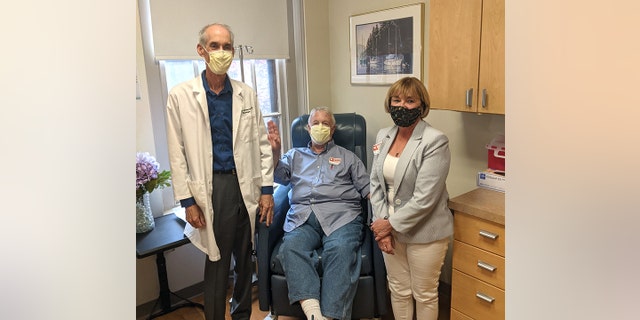
Fox News Flash top headlines for June 16
Fox News Flash top headlines are here. Check out what’s clicking on Foxnews.com.
A Rhode Island man became the first patient worldwide to receive Biogen’s hotly debated Alzheimer’s drug outside of a clinical trial on Wednesday, a hospital spokesperson confirmed to Fox News.
Marc Archambault, 70 of Wakefield, received the infusion shortly before noon at Butler Hospital in Providence, according to spokesperson Raina Smith of Care New England. The patient met the criteria for people diagnosed with mild cognitive impairment or early Alzheimer’s disease, Smith said.

Dr. Stephen Salloway, director of the memory and aging program at Butler Hospital, patient Marc Archambault, and Marc’s friend Karen Poole. (Photo courtesy of Care New England Health System and Butler Hospital)
“It’s transforming how we treat Alzheimer’s,” Dr. Stephen Salloway, director of the memory and aging program at Butler Hospital, said at a press conference. “For those of you who don’t know, it’s a devastating disease.”
“Marc actually tried out for aducanumab [trials] twice but he flunked because he did too well on his memory tests,” Salloway said. “We knew he had Alzheimer’s and he was building up amyloid plaques in the brain and had an increased genetic risk for Alzheimer’s.”
The patient, Archambault, also spoke during the press conference, thanking his doctors.
“It’s just amazing to think that this will be helpful and the other drugs that will come in the future so that my children don’t have to worry about it as well, and my family,” Archambault said.
“It’s a slow situation, I still work, I’m a realtor,” he continued, reflecting on his course of disease. “A few years ago I realized I was gonna have to retire…luckily my real estate brain is still here.”
The Food and Drug Administration last week approved Biogen’s Alzheimer’s drug albeit to mixed reviews. It is the first drug approved for Alzheimer’s in nearly 20 years. Part of the controversy in the medical community surrounding the drug’s approval stems from data collected during two Phase 3 clinical trials. One study met the primary endpoint and showed a reduction in clinical decline, while the other did not. In November 2020, the Peripheral and Central Nervous System Drugs Advisory Committee had said it was not reasonable to consider clinical benefit of the drug based on one successful study.
“If the person is too far along in their disease, it’s not going to work, we don’t want to waste important health care dollars,” Scharre told Fox News at the time.
If a patient starts treatment early, studies suggested a 23% slow in decline.
This is a developing story, please check back for updates.
Fox News’ Alexandria Hein contributed to this report.
Source: Read Full Article
